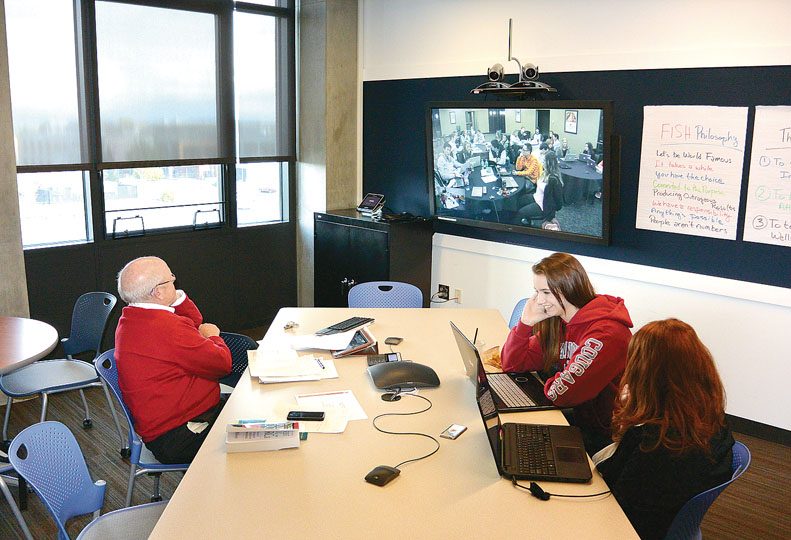
Home » WSU's senior housing management class grows
WSU's senior housing management class grows
Industry helped to develop course with hospitality focus

February 11, 2016
More hospitality management students are showing interest in the senior housing management niche, says Nancy Swanger, a professor with Washington State University’s School of Hospitality who oversees a class on senior housing management.
The school first partnered with retirement housing executives in 2010 to begin providing students with a class on the topic. Swanger says the first class had 15 students, and an upcoming class has 34 students signed up.
“Offhand, I can think of 14 students that took the class, and then went on to work in a senior housing community,” says Swanger, adding, “In fact, it has been so successful that we have plans to create an online curriculum and certificate program that we would offer through WSU’s global format.”
The existing course is being modified for online delivery. The rest of the hospitality program is now available online, and the senior housing management class will be offered as part of it.
Swanger says senior housing industry leaders approached her with the idea for the class. She says they discussed the changes in senior housing and the success they’ve had hiring people with hospitality backgrounds instead of a more traditional medical background.
Bill Pettit, president and chief operating officer at R.D. Merrill, which owns The Academy senior living community here and other retirement facilities throughout the West, worked with several other senior living executives to hammer out the curriculum for this upper division class.
The class has been taught five times, with a sixth session set to start in March. It has averaged 25 students to date. The class is industry driven and delivered. Swanger says that as the instructor of record, she recruited senior living executives to modify the curriculum and line up speakers. The class is taught once per week in a three-hour block. All the executives travel to Pullman at their own cost to teach the class.
The course changes each time it’s offered, with some elements being added and others deleted. Swanger asserts that the curriculum is cutting edge. She says it’s experiential and hospitality driven, rather than based on a nursing home model, and it has also created job and internship opportunities for students who are interested in the field of senior housing management.
Two industry trade groups, the American Senior Housing Association and Argentum, have been supportive of the class and the university’s plans for a certificate program. Swanger hopes that WSU will have by the end of the year a certificate program for working professionals who want to seek employment or be promoted within the industry.
Pettit says the requirements to work in the senior housing market have changed tremendously over the last few decades, and senior residents’ needs are different. They are healthier and living longer and are in need of more activities, social opportunities, and hospitality-oriented staff support.
“They want a less clinical environment than was the norm 20 years ago,” says Pettit.
He says that, coupled with projected growth in the demand for services, is why the connection to WSU’s hospitality program is so critical.
“Over the next 10 years, this industry needs to attract 1.2 million workers as aging baby boomers plan for their care and lifestyle requirements,” Pettit says. “The industry is now about 25 years old in its current form. We are seeing the retirement of people that have been in the industry as well.”
As a result, he says, the industry needs to deal with succession planning and developing future leaders with knowledge in both care and hospitality. He says managers now need less knowledge on the care side and more on hospitality, sales, management, dining services and physical plant management.
People really retire twice—once when they stop working and again when they slow down and drive less, stay at home more, and begin to need assistance with regular tasks, Pettit says. It is the latter group that is traditionally the retirement home industry’s clients.
“Our typical client is in their 70s through 90s, socially active, wanting to establish new friendships and engage in fun activities. They are just looking for the freedom from household chores, home maintenance, yard work, and sometimes driving,” he says.
He adds, “The perception that not remaining in your home decreases your freedom is far from the truth.”
Those factor and the onset of baby boomers retiring is why programs such as the one WSU is offering are so important, and why getting a certificate program and online curriculum started is a pressing need as well, he says.
“It’s also why we have such a cooperative group of industry leaders involved. Even though we may be competitors in the marketplace, we all recognize the need for highly skilled professionals in this field,” Pettit says.
He adds, laughing, “Although we do challenge each other and try to beat out one another when it comes to hiring the best and brightest students from the classes.”
As for Swanger, along with the planned certificate program and online curriculum, she says, “We want to keep a strong relationship with business partners from the senior housing sector and keep them in front of the students.”
Swanger describes the relationship between industry representatives and the students as fantastic and says it’s important that students have real-world knowledge so they can enter the workforce well prepared.
“We strive to do that in the hospitality school,’ she says, “and will carry that ideal forward as we expand the opportunities for students to learn about and hopefully join the senior housing industry.”
Latest News Special Report Education & Talent
Related Articles
Related Products



![Brad head shot[1] web](https://www.spokanejournal.com/ext/resources/2025/03/10/thumb/Brad-Head-Shot[1]_web.jpg?1741642753)
